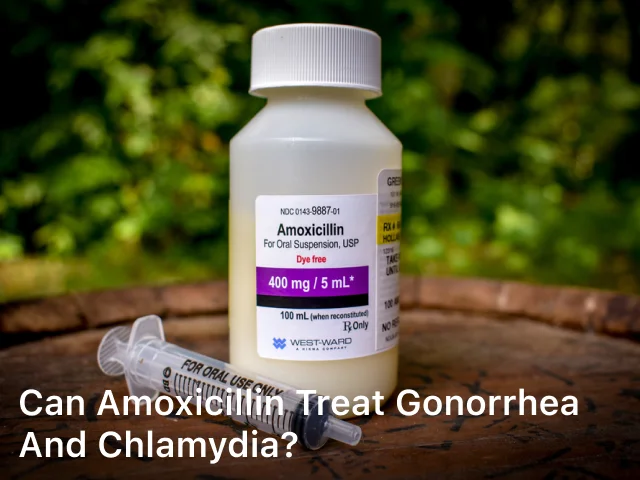Can Amoxicillin Treat Gonorrhea and Chlamydia?

Can Amoxicillin Treat Gonorrhea and Chlamydia? Discover if amoxicillin is a viable treatment for gonorrhea and chlamydia. Learn about its effectiveness, dosages, and potential side effects.
When it comes to treating sexually transmitted infections (STIs) like gonorrhea and chlamydia, finding the right medication is crucial. One common antibiotic that often comes up in discussions about treating these infections is amoxicillin.
In this comprehensive article, we will explore whether amoxicillin can effectively treat gonorrhea and chlamydia. We’ll dive into the dosages, effectiveness, potential side effects, and much more.
Can Amoxicillin Treat Gonorrhea and Chlamydia?
Amoxicillin, a widely used antibiotic, has proven effective in treating various bacterial infections. However, when it comes to gonorrhea and chlamydia, its efficacy is a subject of debate. Let’s examine the details.

The Mechanism of Amoxicillin
Before we delve into its effectiveness against these STIs, it’s essential to understand how amoxicillin works. Amoxicillin is a type of penicillin antibiotic that targets the bacterial cell wall, preventing the bacteria from growing and reproducing. This mechanism of action can be effective against certain bacterial infections.
Amoxicillin for Gonorrhea
Gonorrhea is a bacterial infection caused by Neisseria gonorrhoeae. Historically, amoxicillin was used to treat gonorrhea. However, due to increasing antibiotic resistance, it’s no longer the preferred treatment in many regions.
In some cases, it may still work, but healthcare providers typically prescribe alternative antibiotics like ceftriaxone. Always consult with a healthcare professional for the most up-to-date treatment recommendations.
Amoxicillin for Chlamydia
Chlamydia, on the other hand, is caused by the bacterium Chlamydia trachomatis. Amoxicillin is not the first-line treatment for chlamydia. Instead, healthcare providers often prescribe azithromycin or doxycycline, which are more effective against this specific infection. Using the right antibiotic is crucial to ensure complete recovery.
Dosages and Treatment Duration
If a healthcare provider determines that amoxicillin is the appropriate treatment for gonorrhea or chlamydia in your case, they will prescribe a specific dosage and treatment duration. It’s crucial to follow these instructions precisely to ensure the infection is fully eradicated. Failure to complete the prescribed course can lead to antibiotic resistance and treatment failure.
Potential Side Effects
Like any medication, amoxicillin can have side effects. Common side effects include nausea, diarrhea, and stomach pain. In some cases, individuals may experience allergic reactions, which can be severe. If you notice any adverse effects while taking amoxicillin, contact your healthcare provider immediately.
Keep Reading :
FAQs
Can I use amoxicillin I have at home to treat gonorrhea or chlamydia?
No, it’s not advisable to use leftover antibiotics to treat STIs. The dosage and treatment duration must be prescribed by a healthcare professional to ensure effective treatment and prevent antibiotic resistance.
Is it safe to have sexual intercourse while taking amoxicillin for an STI?
It’s crucial to avoid sexual intercourse until you have completed the full course of antibiotics and received confirmation from your healthcare provider that the infection is cleared. Engaging in sexual activity during treatment can risk spreading the infection to others.
Can amoxicillin cure other STIs?
Amoxicillin is not effective against all STIs. It’s essential to receive a proper diagnosis and treatment plan from a healthcare provider for each specific infection.
How long does it take for amoxicillin to work against gonorrhea and chlamydia?
The timeframe for improvement can vary, but it’s essential to complete the full course of antibiotics as prescribed. Improvement may be seen within a few days, but continue taking the medication as directed.
Can I drink alcohol while taking amoxicillin for an STI?
It’s generally not recommended to consume alcohol while taking antibiotics, as it can reduce their effectiveness. Consult with your healthcare provider for specific guidelines.
What should I do if I experience severe side effects from amoxicillin?
If you experience severe side effects or allergic reactions, seek immediate medical attention. It’s essential to report any adverse effects to your healthcare provider.
Conclusion
In conclusion, amoxicillin can be used to treat gonorrhea and chlamydia in certain cases, but it’s not the first-choice antibiotic for these infections due to increasing antibiotic resistance. Always consult with a healthcare provider for an accurate diagnosis and the most appropriate treatment plan.
Remember to follow the prescribed dosage and treatment duration to ensure a full recovery. If you have any concerns or experience adverse effects while taking amoxicillin, don’t hesitate to reach out to your healthcare professional for guidance.
